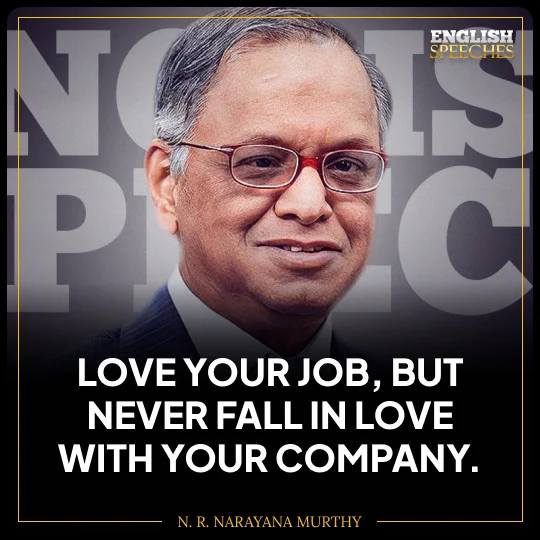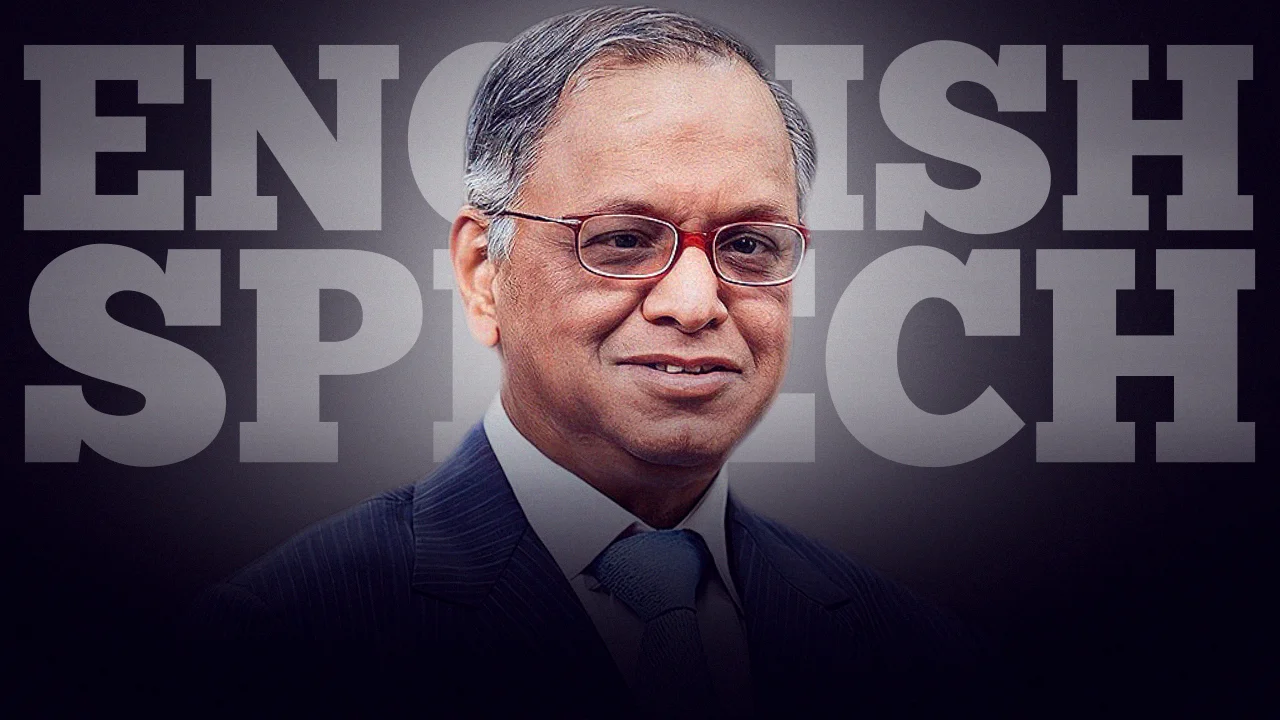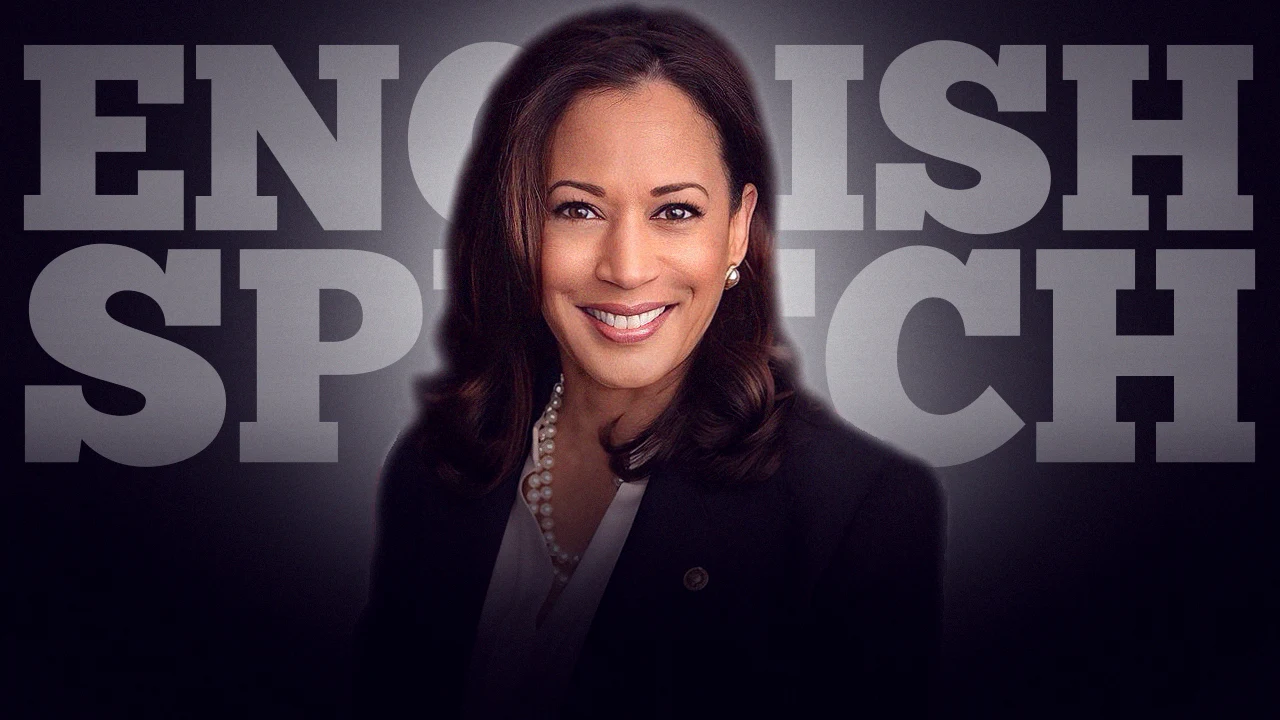Learn English with N. R. Narayana Murthy. Join him as he delivers an inspiring address to the students at the 58th Convocation. Murthy shares his journey, the challenges he faced, and the lessons he learned while building Infosys. Discover his vision for the future and the importance of values, fairness, and a culture of meritocracy in transforming society and leading with integrity.
Donwload available for Premium Subscribers
PDF Full Transcript
Explore every word with our concise PDF transcripts.
Audio Version
Immerse in speeches with clear, downloadable audios.
English Lesson
Enhance English skills with interactive speech lessons.
⚬ Free 30-day trial

”Love your job, but never fall in love with your company.
Download available
for Plus Members
PDF Transcript
Access the full speech in an
easy-to-read PDF format.
Audio Version
Listen and download clear,
high-quality MP3 recordings.
English Lesson
Includes vocabulary
and grammar practice.
Offer ends in:
Offer ended.
Transcript
Well, what a beautiful view this is. Green trees in front, unbelievably good architecture on both sides, and most importantly, probably the country’s highest density of intellectuals. What more, what more can anybody ask for? The last time I saw this wonderful view was in the movie Two States. I can tell you folks, having watched so many of you pass through it, I am positive that the batch of 2023 can give tough competition to Alia Bhatt and Arjun Kapoor.
Chairman, members of the governing body, director, faculty, staff, students, guests, graduating students, I thank you for inviting me to be part of this joyous occasion. Congratulations to the graduating students on completing this worthy penance. You are now all set to shoulder the aspirational task of transforming our country and the world with the competence and the values that you possess. The knowledge, wisdom, writing skills, modeling, analytical thinking, Socratic questioning, group discussions, teamwork, and decision-making skills that you have acquired here from your revered teachers will definitely assist you in your future.
I am happy to come back to a place where I started my career when none of you was born. It was in 1969. I learned much being the chairman of this venerable institution from 2002 to 2007. Today, my talk will be very similar to the one I gave recently at the 40th-year celebrations of Infosys, the company I founded. The context is different, but the lessons for both the graduating class here and the Infosys out there are the same.
I have often been asked why I started Infosys. Let me answer that. I grew up in a family of eight children, a mother, a father, and a grandmother. My father was a school teacher in a small town. It was drilled into my young mind that my fate would be limited by the circumstances that I was born into. The India that I experienced in my youth was a lower-middle-class India with small hopes and even smaller dreams. I had simply accepted that there would be a glass ceiling to most professional ladders in corporate India of those days. Corruption and connections in government were common for success in most businesses then.
That retrogressive mindset of mine changed gradually when I started working in a French real-time software company in Paris more than 50 years ago. I learned three important ideas: The power of entrepreneurship in a free market in creating jobs and prosperity for the nation. Second, the beauty of an enlightened corporate democracy and the role of compassionate capitalism in building a prosperous and happy country. I was also influenced by the writings of Mahatma Gandhi, Max Weber, Franz Fanon, and Karl Polanyi. After learning these lessons, I decided to return to my hometown, Mysore, traversing Western and Eastern Europe, Israel, and West Asia, hitchhiking and spending just four to five dollars a day. That journey irrevocably transformed me from a confused leftist to a determined, compassionate capitalist.
After I returned to India, I decided to conduct an experiment based on these three important ideas that I spoke about. My first attempt, Softronics, failed since there was no domestic market for software development in India at that time. I learned my lesson and started my second attempt, Infosys, after my stint as a general manager at Patni Computer Systems Pvt. Ltd. I collected a set of bright and value-based youngsters there to assist me in building Infosys. Fortune conspired with us in the form of the 1991 economic reforms of India ushered in by late Shri Narasimha Rao and Doctor Manmohan Singh. The rest, my young friends, is history.
While I did not expect to address every challenge of our society in my Infosys journey, I hoped to create a microcosm that did not suffer from the injustice, inequity, discrimination, and unfairness of the society that I had seen or experienced around me when I was growing up. I wanted to create a company of the professional, for the professional, and by the professional, as Abe Lincoln defined a democracy. I wanted this corporate child of mine to be an expression of the best that the corporate world and society could offer. I wanted it to be a place where a person from any race, any religion, caste, nationality, and economic stratum could succeed based on competence and values.
A place where people from the forgotten fringes of our society could compete with confidence, perform, earn respect, occupy the center stage, and with luck, run the company. A place where fairness and justice would be the norm. A place where imagination, speed, and excellence in execution would be the watchword. A place where there was no upper tier between the management and the employees. A place where the dignity of the professional was sacrosanct. A place where merit was revered in every transaction. A place where the CEO and the janitors shared the same canteen and the same toilet. A place where graft would be taboo. A place where people would celebrate deferred gratification, would not pilfer from the corporate kitty, and do what is right for the entire company.
A place where the asymmetry of information between the management and the shareholders dissolved like dew on a sunny morning. A place where you could disagree but could not be disagreeable. A place where the seniors wholeheartedly and enthusiastically shared wealth with everyone who participated in generating it. And ultimately, a place where the inner voice exhorted every Infoscian to demonstrate the best of entrepreneurship, compassionate capitalism, enlightened corporate democracy, and time-invariant and context-invariant values. This, to me, has been the Infosys I dreamt of from the first day I discussed it with my then friend and today my wife in 1977. Even today, my undying passion burns bright for these ideas that have made Infosys special.
My dream for Infosys has never been just that of a profit-making machine, but rather an experiment and a demonstration of social change for the betterment of my country. Infosys has been a perfect manifestation of my belief that one’s fate need not be determined solely by one’s birth. Infosys has been an umbrella, offering shelter to many who shared the same belief. I wish to share with you what I have learned in this extraordinary journey and what has made Infosys unique. Each one of these precepts has been a foundational pillar for building Infosys over the past four decades plus. My hope is that every one of you, whether you become corporate leaders, whether you become entrepreneurs, or whether you pursue the academic line, will find these ideals useful and demonstrate them throughout your career.
First, a culture of meritocracy and values should determine the mindset of a company. Culture is the strong foundation on which the superstructure of aspirations, dreams, hopes, and their conversion to reality rests. Remember that Peter Drucker once said, “Culture eats strategy for lunch.” Second, competence, commitment, and character are the essential ingredients for a company to earn the respect of the stakeholders and to achieve enduring success. The best management guru, my friend, sorry for saying it, is the market competition. Fourth, the most powerful instrument of a leader is leadership by example in demonstrating courage, sacrifice, hope, confidence, innovation, hard work, truth, fairness, transparency, accountability, austerity, discipline, a good value system, and most importantly, open-mindedness.
Five, how you behave when you are on top and have power and wealth is your true character. In such moments, your grace, your courtesy, and your humility shown to others will reveal the real you. Six, a confident leader hires people smarter than himself or herself. Such a leader gets the best out of his or her people by creating an environment of openness to new ideas, values, meritocracy, fairness, transparency, speed, justice, imagination, discussion, excellence in execution, and questioning. Remember that questioning is the primeval soup of imagination. Without questioning, my young friend, there is absolutely no progress. Seventh, putting the interests of the company ahead of one’s personal interests in the short and medium term results in the betterment of one’s personal interests in the long term.
Eighth, performance leads to recognition, recognition leads to respect, and respect leads to power. Ninth, respect enhances trust in the company among stakeholders, leading to repeat business from customers, attracting quality employees, and long-term investors. Respect also enhances cooperation from partners, the government of the land, and society. Tenth, market access and talent access determine the success of a company. Eleventh, sales and finance are the lifeblood functions of a company. Twelfth, price is what you pay and value is what you expect from what you buy. Every customer looks for the best value for money in every purchase. Therefore, a company that enhances differentiated value to the customers using continuous innovation will obtain premium pricing. Competing merely on price will restrict the company to a commodity market. My young friends, such a company will eventually atrophy.
Thirteenth, free cash flow is the best index of the success of a company. You all know that profit is just an opinion. The real thing is cash in the bank. Fourteenth, transparency in everything you do is, counterintuitively, a competitive advantage. I want you to remember this very importantly. Fifteenth, respected leaders avoid any asymmetry of benefits in their own favor vis-a-vis other stakeholders, particularly the minority shareholders. Good governance is enhanced by adhering to honesty, fairness, transparency, and accountability in every transaction. It requires values, suppression of greed, and fearless governance. Sixteenth, success, my young friends, is half due to performance and half due to luck. I want you to remember this very importantly because I want every one of you to be humble. As Louis Pasteur once said, “Chance favors the prepared mind.” So you must do everything possible for success before you invoke God.
Seventeenth, fairness is the most important attribute for any decision. Practice the Latin proverb, “audi alteram partem,” which means listening to the other side. Fairness, my friends, is maximized by listening to the other side and using data and facts. Eighteenth, across the world and particularly in a country like India, where the majority of the people are poor, the best way to make capitalism attractive is for corporate leaders to exercise self-restraint in their perks, profligacy, compensation, and lifestyle. After all, remember the words of Socrates, who said, “The secret of happiness lies not in seeking more but in developing the capacity to enjoy less.” The last one, the nineteenth, and the most important one, is to remember that the softest pillow is a clear conscience. Therefore, when in doubt, disclose.
These ideals, my friends, I have expressed are not rhetorical. We at Infosys have lived them. We have fought for them. We have sacrificed for them. We have suffered for them. And we have celebrated them. In the future, at a time when there is fog on your windshield, I hope these time-invariant and context-invariant ideals will serve you in gaining clarity. Living these ideals has reinforced the eternal idea that the purpose of life is to leave our context a little better before we leave this world. These ideals, my young friends, define the finish line. Until these ideals become your second nature, my young friends, your journey and your mission will not be over.
This is my charge to every one of you gathered here today, particularly the six hundred people who obtained their degrees. You will have to live these ideals and bequeath them to future generations. My hope for India of the future is that you, the future corporate leaders, the future academicians, the future entrepreneurs, will ensure that for all ages, for all seasons, for all regions, for all businesses, and for all people, our country will be led by the ideals I have laid out here today. Finally, be original, be daring, be unreasonable, be anything that will assert the integrity of your purpose. Thank you very much.






